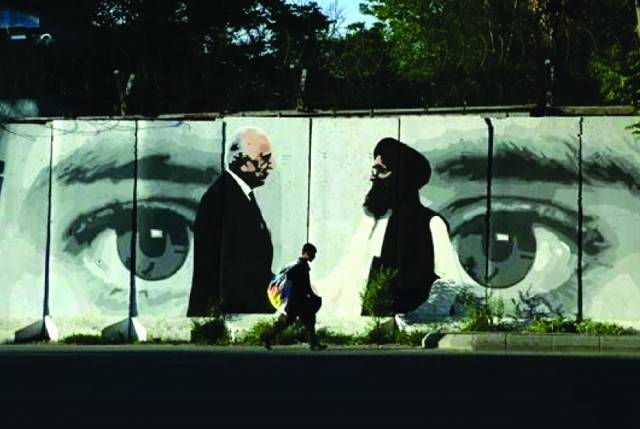
The Doha agreement has failed to bring peace to Afghanistan. While the withdrawal of US troops continues, and will be completed by September 11, violence in the country has increased. A sense of frightening stalemate is in the air. On Wednesday, the Pakistani prime minister, Imran Khan, also talked of the possibility of recurring “1989-like situation.”
The Pakhtun belt of Pakistan is the most worried. No one else in the country is as much impacted by the vacuum from a stalemated peace process. The Pakhtuns more than any other have waded in blood due to the civil war in Afghanistan, influx of refugees and the rise of militant Taliban in their midst.
With bated breath they see the withdrawal of foreign forces from Afghanistan both as an opportunity and risk.
The war on terror has defined their region during the last few decades. Its closure, if at all it comes about, will redefine their region for generations to come, they know.
They hope that the Pakistani state, learning from mistakes of the past, will put its own house in order. But they also dread the consequences of not undertaking course correction. They fear that the beneficiaries of a war economy might prevail. They fear the security policies devised behind opaque curtains, which have proven to be disastrous, might still continue.
The Doha agreement was reached by the US negotiating secretly with the Taliban for 18 months behind the back of the Afghan government. Pakistan takes pride in making it happen.
That agreement gave legitimacy to the Taliban who got over 5,000 prisoners released. The elected government in Kabul was delegitimized. The US secretary of state wrote a threatening letter to President Ashraf Ghani, warning that the Taliban were knocking at the gates.
The Doha agreement altered the meaning of ‘global terrorism’ by implicitly creating a distinction between global terrorists that attacked US interests and the local terrorists who may kill citizens with impunity.
The Taliban were thus emboldened to attack the civilians. At the same time, they demanded that more prisoners be released and their leaders removed from the terror lists. The Taliban pledged to protect the US troops during the pullout, but not Afghan citizens. They were given license to continue targeting citizens, schools, teachers and professionals and all symbols of peace and progress.
This is what Pakistan’s misguided strategists made possible.

The Taliban have not spelt out what they want, at least not until now. Do they want a negotiated political solution or a solution imposed by the barrel of the gun? By refusing to participate in the Istanbul conference and later putting forth three ridiculous conditions, they showed that their objective is not a peaceful political settlement. Their character has not changed from that of an anarchist militia using violence as its main tool.
The Afghan Taliban have historic relations with Pakistan’s security forces as well as with armed groups like TTP, LeT, and others and those links have not been completely severed. The so-called Dawn Leaks was nothing but an expression of deep anguish by the civilian political leadership. But it led to the chasing out of office of a legitimate prime minister.
Worries that there is no course correction persist and haunt the present moment.
Since October 2001, we have welcomed and hosted Taliban and Al Qaeda leaders like Osama Bin Laden, Mullah Mansoor Akhtar, Mullah Haibatullah and countless more but have denied Quetta Shura, Haqqani network and safe heavens on our soil.
“Give us the addresses and contact numbers of the Shura and the Taliban leaders and we will take them out,” General Musharraf used to tell the world. Offending common intelligence comes too easily to our security establishment. The mindset has not changed.
Over the past decades, the relationship between Taliban and Pakistan’s security establishment has grown so close that some have even likened it to the relationship between Tehran and Hezbollah.
Proxy wars were waged across its borders through non-state homegrown militants with close links to Taliban. We denied it. But the truth is that proxy wars have been a main driver of continuing conflict in the Pakhtun belt.
Whatever is happening in the country today, whether continued militarization of ex-FATA or the opaque internment centers, or the phenomenal rise of extremist sectarian groups, it is the direct outcome of this disastrous policy. Frustrated, the tribal youth finally rose a few years ago. They expressed their anger using metaphors that could not have been imagined a few years ago.
The Afghan Taliban and Pakistani Taliban are one and the same. An exclusive Taliban government foisted by force in Afghanistan will embolden Tehreek-i-Taliban Pakistan (TTP) and other militant organizations like the ‘banned’ outfits LeT, JeM, SSP in Pakistan. In talks with Pakistani friends, Afghan intellectuals have often talked of the paradox of Pakistan killing TTP militants but supporting the TTA militants
The Pakhtun belt is on fire. It cannot afford a return to the “1989-like chaos”. The proxy wars must end. Claims of ending it must be credible and verifiable. If we do not do it ourselves the world might be forced to act. There are straws in the wind already.
We must demilitarize, de-colonize FATA, return it to civil rule and open up the area. Why should the tribal areas continue to be under military rule even after the merger? Keeping it closed and inaccessible to the media, members of parliament and civil society organizations create suspicions.
Pakistan and Afghanistan accuse each other of cross border infiltration. To end such bickering, we should invite the UN Mission for monitoring civilian and military movement of cross border security threats from both sides. Have we not demanded that India allow UN Observes Group patrolling along the LoC?
Another lethal fault line must not be allowed to develop cutting across all other divides: the Pakhtun belt versus the rest.
The writer is a former senator
The Pakhtun belt of Pakistan is the most worried. No one else in the country is as much impacted by the vacuum from a stalemated peace process. The Pakhtuns more than any other have waded in blood due to the civil war in Afghanistan, influx of refugees and the rise of militant Taliban in their midst.
With bated breath they see the withdrawal of foreign forces from Afghanistan both as an opportunity and risk.
The war on terror has defined their region during the last few decades. Its closure, if at all it comes about, will redefine their region for generations to come, they know.
They hope that the Pakistani state, learning from mistakes of the past, will put its own house in order. But they also dread the consequences of not undertaking course correction. They fear that the beneficiaries of a war economy might prevail. They fear the security policies devised behind opaque curtains, which have proven to be disastrous, might still continue.
The Doha agreement was reached by the US negotiating secretly with the Taliban for 18 months behind the back of the Afghan government. Pakistan takes pride in making it happen.
That agreement gave legitimacy to the Taliban who got over 5,000 prisoners released. The elected government in Kabul was delegitimized. The US secretary of state wrote a threatening letter to President Ashraf Ghani, warning that the Taliban were knocking at the gates.
The Taliban have not spelt out what they want, at least not until now. Do they want a negotiated political solution or a solution imposed by the barrel of the gun?
The Doha agreement altered the meaning of ‘global terrorism’ by implicitly creating a distinction between global terrorists that attacked US interests and the local terrorists who may kill citizens with impunity.
The Taliban were thus emboldened to attack the civilians. At the same time, they demanded that more prisoners be released and their leaders removed from the terror lists. The Taliban pledged to protect the US troops during the pullout, but not Afghan citizens. They were given license to continue targeting citizens, schools, teachers and professionals and all symbols of peace and progress.
This is what Pakistan’s misguided strategists made possible.

The Taliban have not spelt out what they want, at least not until now. Do they want a negotiated political solution or a solution imposed by the barrel of the gun? By refusing to participate in the Istanbul conference and later putting forth three ridiculous conditions, they showed that their objective is not a peaceful political settlement. Their character has not changed from that of an anarchist militia using violence as its main tool.
The Afghan Taliban have historic relations with Pakistan’s security forces as well as with armed groups like TTP, LeT, and others and those links have not been completely severed. The so-called Dawn Leaks was nothing but an expression of deep anguish by the civilian political leadership. But it led to the chasing out of office of a legitimate prime minister.
Worries that there is no course correction persist and haunt the present moment.
Since October 2001, we have welcomed and hosted Taliban and Al Qaeda leaders like Osama Bin Laden, Mullah Mansoor Akhtar, Mullah Haibatullah and countless more but have denied Quetta Shura, Haqqani network and safe heavens on our soil.
“Give us the addresses and contact numbers of the Shura and the Taliban leaders and we will take them out,” General Musharraf used to tell the world. Offending common intelligence comes too easily to our security establishment. The mindset has not changed.
Over the past decades, the relationship between Taliban and Pakistan’s security establishment has grown so close that some have even likened it to the relationship between Tehran and Hezbollah.
Proxy wars were waged across its borders through non-state homegrown militants with close links to Taliban. We denied it. But the truth is that proxy wars have been a main driver of continuing conflict in the Pakhtun belt.
Whatever is happening in the country today, whether continued militarization of ex-FATA or the opaque internment centers, or the phenomenal rise of extremist sectarian groups, it is the direct outcome of this disastrous policy. Frustrated, the tribal youth finally rose a few years ago. They expressed their anger using metaphors that could not have been imagined a few years ago.
The Afghan Taliban and Pakistani Taliban are one and the same. An exclusive Taliban government foisted by force in Afghanistan will embolden Tehreek-i-Taliban Pakistan (TTP) and other militant organizations like the ‘banned’ outfits LeT, JeM, SSP in Pakistan. In talks with Pakistani friends, Afghan intellectuals have often talked of the paradox of Pakistan killing TTP militants but supporting the TTA militants
The Pakhtun belt is on fire. It cannot afford a return to the “1989-like chaos”. The proxy wars must end. Claims of ending it must be credible and verifiable. If we do not do it ourselves the world might be forced to act. There are straws in the wind already.
We must demilitarize, de-colonize FATA, return it to civil rule and open up the area. Why should the tribal areas continue to be under military rule even after the merger? Keeping it closed and inaccessible to the media, members of parliament and civil society organizations create suspicions.
Pakistan and Afghanistan accuse each other of cross border infiltration. To end such bickering, we should invite the UN Mission for monitoring civilian and military movement of cross border security threats from both sides. Have we not demanded that India allow UN Observes Group patrolling along the LoC?
Another lethal fault line must not be allowed to develop cutting across all other divides: the Pakhtun belt versus the rest.
The writer is a former senator

